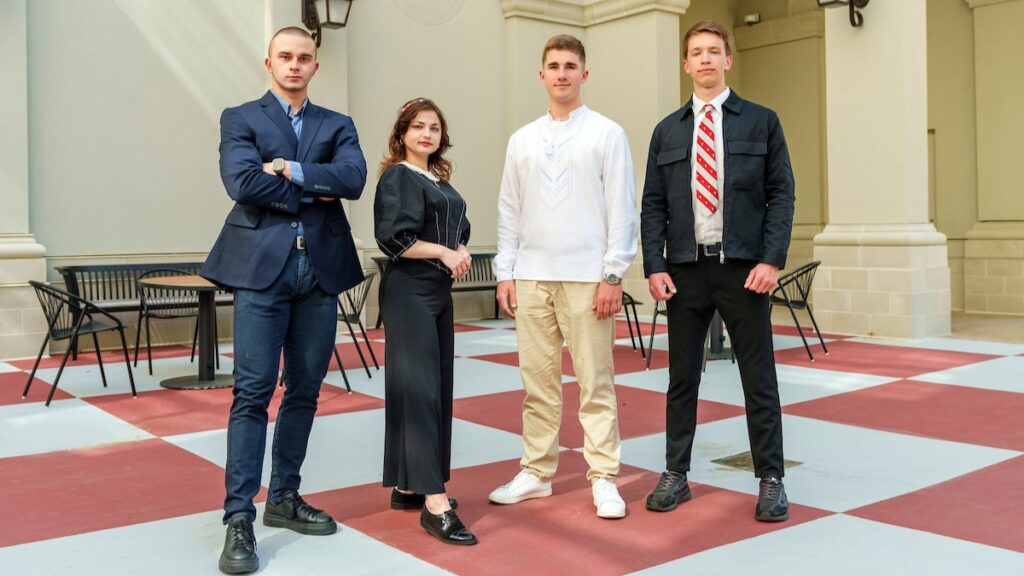
Photo: Ukranian exchange students pose in the Class of 1979 courtyard outside of Capers Hall. Left to right: Vladyslav Voloshyn, Zlata Tabachna, Denys Yashchuk and Lev Peschykhin.
Four Ukrainian citizens are back home after spending the spring 2024 semester as exchange students at The Citadel through the Global Undergraduate Exchange (UGRAD) Program.
This is the first time The Citadel has partnered with the UGRAD Program, which provides one-semester scholarships to outstanding undergraduate students from around the world for non-degree, full-time study combined with community service, professional development and cultural enrichment.
The UGRAD Program is an initiative of the U.S. Department of State’s Bureau of Educational and Cultural Affairs, funded by the American people through an appropriation from Congress.
Led by The Citadel President Gen. Glenn Walters, USMC (Ret.), ’79, and Provost Sally Selden, Ph.D., SPHR, The Citadel applied to be a host institution in order to expand the college’s early support for Ukrainian citizens.
With help from The Citadel’s Center for International and Special Programs, the four Ukrainian students spent the spring immersed into American university life and learning more about the local community. These four Ukrainians are only the first to attend The Citadel through the UGRAD program – three more have already been accepted and will attend during the spring 2025 semester.
Before returning to Ukraine, The Citadel’s first four UGRAD students reminisced on their lifestyle, academics and time spent in Charleston, South Carolina.
Lev Peschykhin: Embracing the challenges of The Citadel to learn and grow
I learned about the UGRAD Program through the simple power of community. I was a high school exchange student in 2019. The Future Leaders Exchange Student program gave me the opportunity to live and study in Texas for one year. During that period, I made many friends and became part of the alumni community where we share different kinds of opportunities. One day, the UGRAD Program became one of those. The possibility of coming to The Citadel was uncertain because of the Russian invasion, but with the help of our advisors at the U.S. Embassy in Kyiv, we made it here!
As a student at one of the best technical universities in Ukraine — the National Technical University of Ukraine — I was well-prepared to face any academic challenges. I was invited to be a part of a research project about detecting and preventing GPS spoofing attacks on drones this spring semester. There, I gained hands-on experience and learned about the academic aspect of The Citadel from a different perspective. I was amazed at how friendly and approachable the professors could be.
The Citadel added another brick to my tower of character as a man. When you are in such an environment, there’s no other option but to prosper, get to know yourself better and become stronger. I learned how to approach different kinds of people, from knobs to high-ranked staff members and very experienced military veterans.

South Carolina and Charleston was a great place to immerse into Southern culture, which is very vibrant and rich. Thanks to our great hosts for showing us Southern life. We have been to a race at Daytona Beach, shot clays with shotguns, celebrated Easter with their families, ate a lot of BBQ and were constantly amazed by the cowboy boots.
I want to thank the entire Citadel administration for taking care of us and being available whenever we had any troubles. And I want to give a special thank you to Gen. Walters and Dr. Selden for initiating this program and building a relationship with the Ukrainian students. The past four months were probably the best time I’ve had in the last five years of my life.
Zlata Tabachna: Showing cadets the price that Ukrainians pay for their freedom
I said “goodbye” to my mom on January 1st of this year. I packed my suitcase, gave my cat a goodbye kiss and left for a train station to meet the other Ukrainian students.
During our trip, I wondered if I would ever see my family again. With Russians carrying out missile attacks almost every other day, there is always a risk that you lose someone close. I tried to look on the bright side of life — after all, I got a chance to visit one of our country’s closest friends and allies, the United States. And now, I am leaving Charleston with the warmest memories of my life so far.
The best thing about The Citadel was the academics. Daniel Library will forever remain in my heart as the place where I was always accepted, the place where I could quietly sip my Starbucks coffee, write my essay and consult anyone for anything. I loved the library so much that I chose it as a perfect place to put up an exhibition called “Unissued Diplomas,” which told the stories of 40 Ukrainian students who died because of Russian aggression, either on the battlefield or under the rubble of their bombed home.

The Citadel gave me a stage where I could talk freely about Ukraine, and my Ukrainian companions supported me with that. Together, we hosted a Ukrainian Resilience event in the Capers Hall auditorium. We spoke with almost 150 cadets, and we told them about the new Ukraine — the innovations we create, the history we have and the freedom we cherish. I could not help but to celebrate by cooking Ukrainian food for our close friends. By the way, not one burger or waffle can compete with borscht (warm red beet soup) and pampushky (garlic bread) for me. We learned a lot from the United States — now we invite you to explore our country: sovereign, independent and resilient Ukraine.
Vladyslav Voloshyn: Merging the principles of military discipline and commitment to shape Ukraine’s future leaders
In Ukraine, I study at Uzhhorod National University, which is a university without any military focus. This factor did not affect the process of studying at The Citadel in any way — on the contrary, The Citadel became a second home for me. The academic component here is unique and extremely fascinating. Professors are always ready to help you understand a certain subject if you have any difficulties.
When I received an offer to go to The Citadel for a semester, I carefully began researching information about the college. After learning about The Citadel’s core values of honor, duty and respect, I immediately decided to study here.
The Citadel has brought me many challenges but by no means bad ones. The challenges I set for myself first and foremost ranged from improving my physical preparation, such as participating in a morning workout with the cadets at 5:30 a.m., to getting a perfect academic record in all subjects. All these challenges have made a huge impact on my growth, and successfully overcoming them has given me satisfaction and pride in myself.
I realized how much The Citadel has helped me in improving my leadership abilities. Discipline, pushing through my limits and constantly working on myself are the main things that I have truly discovered while being here. I will actively apply the information that I have learned here as part of my studies at the Department of International Relations, in my home university.

I am truly grateful to the fate that brought us together with our American hosts. These cadets did their best to show us the true culture and spirit of America. I can’t imagine experiencing American culture without them.
I would like to thank the staff of The Citadel’s Center for International and Special Programs for providing everything we needed for our group, the cadets for being ready and willing to help in any situation, our hosts for organizing our recreational activities, the faculty for providing unique educational information, and The Citadel administration, headed by Gen. Walters and Dr. Selden, for allowing us to study here.
Returning home, I realize that I have gained the knowledge and skills necessary to rebuild Ukraine soon after our victory. Ukraine is the cradle of brave and strong-spirited people who made the world realize that Russia will inevitably be defeated. It was a great honor for me to represent Ukraine at The Citadel and in the UGRAD Program.
Denys Yashchuk: Finding opportunities for self-improvement and professional growth
My Global UGRAD story started in November 2022, when I heard for the first time about the U.S. Department of State’s undergraduate exchange program. Fourteen months later, in January 2024, I started studying at The Citadel and right now this great journey has come to an end.
At The Citadel I had a comfortable and safe environment for studying and a lot of opportunities for self-development and professional growth. I feel that my proficiency in economics and finances has been significantly improved during this semester. Back in Ukraine most of the students and I face difficulties in pursuing academic degrees. This is because of day-to-day missile and drones attacks that Russia launches on our cities. This makes the learning process much harder.
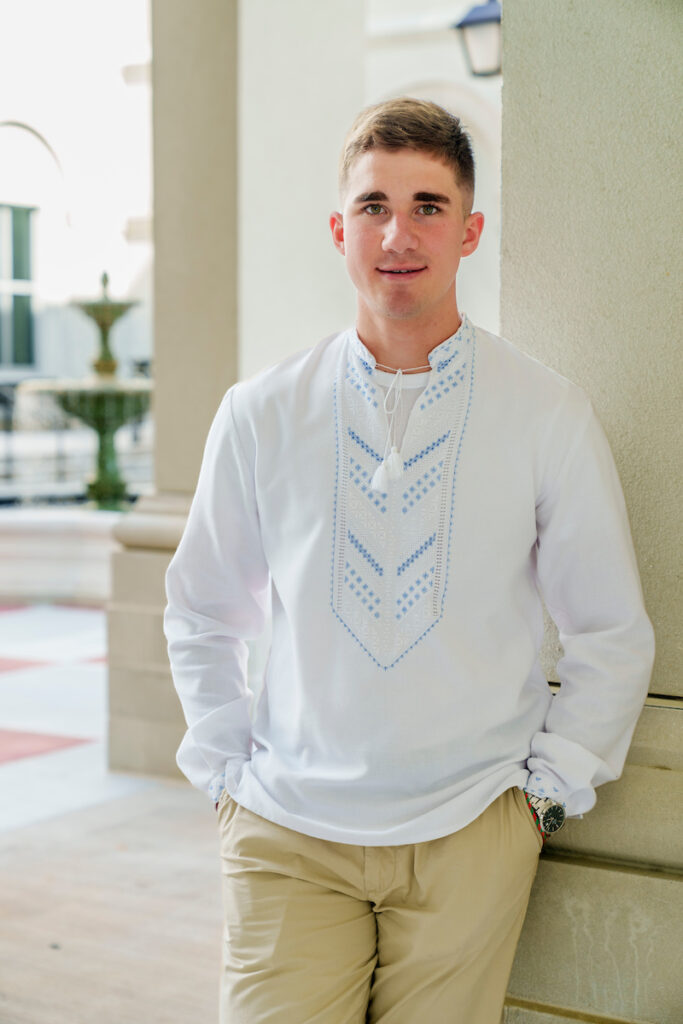
I enjoyed the diverse array of proposed courses, among which I made a combination to boost my hard and soft skills. During this semester I conducted 12 informational interviews with experts in different fields, had a lot of profound discussions with Americans and communicated with fellow cadets. All these interactions significantly improved my communication skills.
During my exchange semester, I visited six states, 10 cities, a car competition, an NBA game, went on an excursion to Congress and celebrated Easter with an American family.
I am grateful for the opportunity to study in the U.S. for a semester and gain valuable experience. Ukraine fights for its independence, liberty and democratic principles. I thank all the American people who support and help Ukraine. Your help saves our lives.
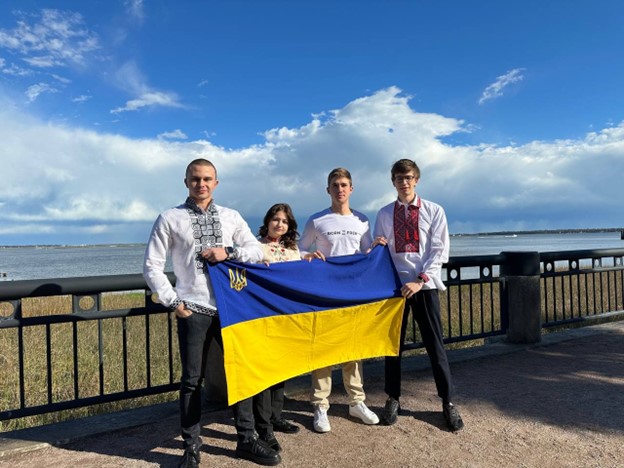

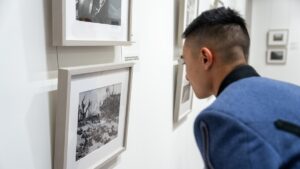 Moore Art Gallery opens “All Hands on Deck” WWII naval photography exhibit
Moore Art Gallery opens “All Hands on Deck” WWII naval photography exhibit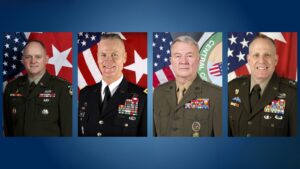 The Citadel’s presidential search committee announces four finalists
The Citadel’s presidential search committee announces four finalists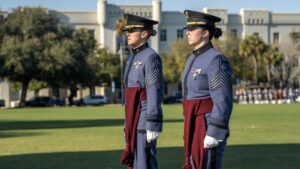 Prestigious Cincinnati and MacArthur awards presented to Citadel cadets
Prestigious Cincinnati and MacArthur awards presented to Citadel cadets


